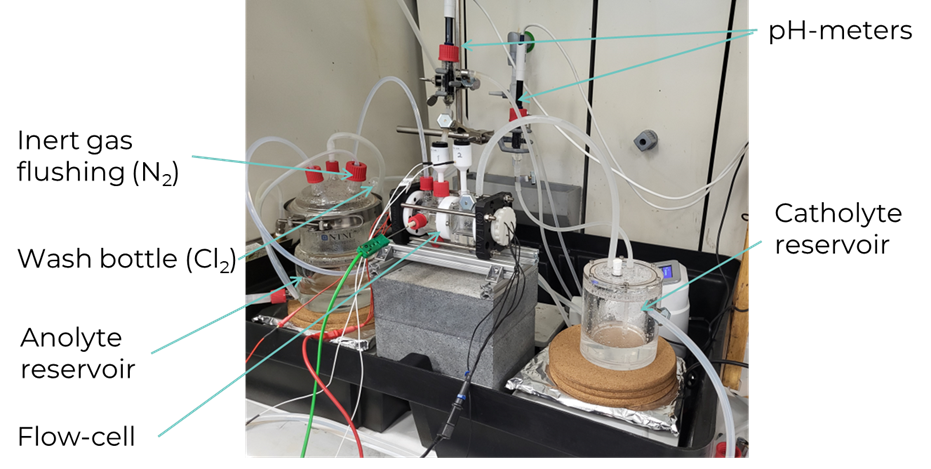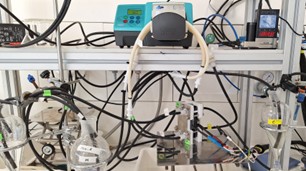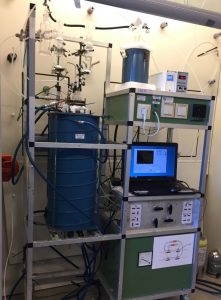
Membrane flow cell setup at SINTEF
In other research facilities, in different corners of Europe, other LiCORNE partners are reporting progress in producing battery-grade materials from various sources – brines, ores (spodumene for example) and off-specification cathode material.
Using the solutions derived from VITO-CAST team’s upstream processes, SINTEF researchers have constructed and commissioned electrochemical cells for electrodialysis of lithium chloride (LiCl) and lithium sulphate (Li2SO4) solutions. Researchers identified the optimal parameters to produce lithium hydroxide (LiOH) or lithium carbonate (Li2CO3), which achieved a current efficiency of approx. 40 % and a specific energy consumption of 20 kWh/kg. Further optimisation of the cell design is expected to reduce the energy consumption.

Membrane flow cell setup at SINTEF
Additionally, this process also produced a mix of Li2CO3 and LiOH through evaporative crystallisation, with a purity of almost 90 %, but showing sodium (Na) as the main impurity interfering with the process.
The organic-based membrane electrolysis, developed at TEC and tested on three types of solutions – those produced by the liquid-liquid extraction processes from brines and from spodumene leachates, and the off-specification cathode leachates – achieved up to 95 % Li yield, far beyond the levels established at the beginning of the project. Their tested carbonation method yielded a Li2CO3 with a purity exceeding 99% in the case of off-specification cathode material and spodumene concentrate materials. Not only the Li recovery target has been achieved, but also the solvent used in the former leaching process has been recovered and reused keeping the performance as initially, aiming for a more sustainable and circular process.

3-chamber Flow cell setup at TECNALIA
The research group at Fraunhofer Institute for Chemical Technology ICT explored a simple, highly scalable method for lithium purification using a combination of Ion Exchange (IE), Reversed Osmosis (RO) and Electrodialysis with bipolar membranes (EDBM) (see figure below). The goal was to recover high-purity lithium carbonate from Lithium-concentrated solutions provided by partners EnBW and KIT. The IE process effectively removed specific impurities (e.g. divalent cations). The significant level of impurities present in the solutions, provided by EnBW, prevented the electrodialysis with bipolar membranes. The EDBM process, applied uniquely on the samples sent by KIT, yielded a 99.89 % purity. However, the yield of the first precipitation step was determined to be around 35 %, highlighting the need for further optimisation in future precipitation cycles.

Setup to prepare Li2CO3 recovery from Li-concentrated solutions starting with ion exchange, via reversed osmosis and electrodialysis. © FRAUNHOFER
SINTEF researchers investigated the extraction of lithium and other valuable elements, such as Co, Ni, Mn from solid raw materials. They achieved selective chlorination of lithium from calcined spodumene concentrate and off-specification cathode waste in LiCl-KCl and CaCl2-NaCl-KCl melts. Theoretical assessments suggest that lithium can be subsequently electrowon from the LiCl-KCl mixture with a purity of approximately 99 %.

Chlorination apparatus at SINTEF
VITO-ELEC team focused on internally-developed Gas-Diffusion Electrocrystallisation (GDEx) technology, which demonstrated high efficiency – achieving lithium extraction rates more than 95 %. VITO-ELEC team successfully extracted lithium from various sources, including geothermal brines, effluents from sorption processing of hard rock beneficiation and the leachates of off-specification cathode materials.
The team has produced lithium carbonate from the extracted lithium by implementing a downstream synthesis procecure. The process achieved a >1 % lithium concentrate increase from geothermal brines and solid product eluates with over 20 % lithium concentration. Moreover, the energy consumption of the GDEx process was below 10 kWh per kg of Li2CO3, with over 90 % lithium recovery from all tested complex matrices.
Research partners from the LiCORNE consortium are working on developing and optimising various technologies to produce battery-grade materials. SINTEF, for instance, have designed, built and tested their advanced electrodialysis apparatus using purified lithium (Li) solutions derived from the upstream treatment processes of Li-ore. Intermediary results show the process will require further optimisation to obtain 99 % purity LiOH and the targeted energy consumption of less than 15 kWh/kg. The research is still ongoing, focusing now on removing the Al ions prior to the electrodialysis process and on investigating new operating parameters.
In another task, working on the optimisation of the conditions for selective chlorination of spodumene concentrate and cathode waste, SINTEF achieved almost 95 % Li yield using CaCl2 -NaCl -KCl melts. Optimisation is underway to replicate the results to the other valuable materials available in the cathode material.
Researchers at TEC have been optimising the organic-based membrane electrolysis process to recover Li from organic solutions as Li2CO3. Results indicate they managed to achieve over 95 % Li yield from off-specification cathode material, while recovering all the organic solvent used in the previous (leaching) step for its reuse. Good yield rates have also been obtained for the treatment of solutions produced in the liquid/liquid [L/L] extraction of brines and spodumene. However, the selectivity of the membrane is insufficient to overcome the migration of the high concentration of other competing cations such as Na, K, Mg and Ca. Researchers are currently producing and testing new PIMs (Polymer Inclusion Membranes) to try to improve the results.
The research group at VITO have been refining their gas-diffusion electrocrystallisation process for Li recovery from brines, achieving over 95 % removal of Li from most of the samples. By manipulating and adding salts to the brine sample, results show that more than 99 % Li is extracted. The energy efficiency of the GDEx process can be improved with the optimisation of the GDEx reactor.
With all technological processes reporting progress and reaching the targets established at proposal stage, future months will rely on the results of the LCA and LCC analysis, which will establish the most promising processes that will enter the upscaling phase.
© visual:Adobe Stock Photos
On 16 October 2024, the Karlsruhe Institute of Technology (KIT) was hosting not only the LiCORNE project’s M24 consortium meeting, but also its first exploitation workshop. The event brought together a diverse group of stakeholders, with nearly 15 industry guests and members of the External Advisory Board (EAB), to discuss the latest advancements in lithium (Li) extraction technologies.
The workshop began with a welcome address by Dr. Lourdes Yurramendi [the coordinator of the LiCORNE initiative and Project Director at TECNALIA Waste Valorisation, Energy, Climate and Urban Transition], followed by Nader Akil, Operations Manager at PNO Innovation Belgium, who outlines the objectives of the exploitation workshop and provided an overview of the LiCORNE project. Funded by the European Commission, the project aims to develop competitive technologies for Li extraction and recovery from various feedstocks, including ores, geothermal brines and cathode waste materials. Following this introduction, various partners delivered technical presentations, showcasing their innovative approaches and key exploitable results after 24 months from the start of the project.
Regardless the feedstock considered, all these novel technologies share one theme: sustainability. This focus on sustainability translates into exploring research routes that go beyond the current state-of-the-art (SoA), reducing energy and water consumption and the generation of chemical waste:
Beyond technological presentations, the workshop also facilitated discussions with external participants, including members of the EAB and industry representatives. These exchanges provided valuable insights into the industry’s needs and opened up new routes for collaboration. To facilitate future collaborations, PNO presented several funding opportunities that can be used to bring the most promising technologies and the LiCORNE selected flowsheet to a pilot level.
As the project progresses, the focus will shift now towards the benchmarking and selection of the most promising LiCORNE technologies for upscaling to produce ~1 kg of battery-grade Li by the end of the project. This phase aims to shape a path towards larger piloting and future commercialisation.
VITO achieves direct lithium extraction, using the Gas-Diffusion Electrocrystallisation (GDEx) technology. GDEx uses gas-diffusion electrodes to achieve this goal, by producing in-situ the necessary quantities of mild chemicals, which in turn form precipitates containing lithium.
During this period, the GDEx team has conducted experiments with synthetic solutions. The effect of adding chemical supplements to the process is being investigated to optimise the lithium recovery yield and selectivity vs. competing ions in solution. After optimising the GDEx process with synthetic streams and learning about the precipitating mechanisms, we are looking forward to extending the process in various geothermal brine solutions obtained from the consortium partners. After precipitation in the form of layered-double hydroxides, the GDEx team will investigate the downstream steps to obtain battery-grade lithium hydroxide.
More information about the GDEx process can be found at http://gdex.vito.be